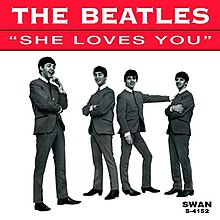I'll Get You
| "I'll Get You" | ||||
|---|---|---|---|---|

Original US "She Loves You" 45 picture sleeve
|
||||
| Single by The Beatles | ||||
| A-side | "She Loves You" | |||
| Released | 23 August 1963 (UK) 16 September 1963 (US) |
|||
| Recorded | 1 July 1963 EMI Studios, London |
|||
| Genre | Merseybeat | |||
| Length | 2:04 | |||
| Label |
|
|||
| Writer(s) | Lennon–McCartney | |||
| Producer(s) | George Martin | |||
| The Beatles singles chronology | ||||
|
||||
"I'll Get You" is a song by the Beatles, written by Lennon–McCartney, and released by the Beatles as the B-side of their 1963 single "She Loves You". The song was initially titled "Get You in the End".
Typical of the Beatles' vocal style of that period, John Lennon and Paul McCartney sing in unison for the majority of the track, allowing the few occasions when they do harmonise to stand out. But unlike most Beatles songs of the time there is no lead guitar break; the lead guitar is virtually reduced to a second rhythm guitar. The most prominent instruments in the track are McCartney's "plumply rounded bass" and Lennon's harmonica, which was overdubbed in a rush as session time ran out.
Beatles writer Bill Harry credits Lennon as the main composer, although McCartney claims it was a 50 / 50 collaboration. McCartney recalls using Lennon's Menlove Avenue home as the writing base for the song; this was rare as Lennon's Aunt Mimi, whom he still lived with at the time, was disapproving of the Beatles.
The song's opening line "Imagine I'm in love with you" was innovative, drawing the listener immediately into the story. McCartney would cite this as an early example of Lewis Carroll's influence on Lennon's lyrics — a ploy explored again in later compositions such as "Lucy in the Sky with Diamonds", "Strawberry Fields Forever" and Lennon's solo "Imagine". Reiterating its A-side's catchphrase ("Yeah"), and assuming the heavy scouse accents conspicuous in their early records, Lennon and McCartney "drawl their way through a mock-naïve love lyric". McCartney later singled out the chord change underneath "It's not like me to pretend" (moving from a D major to A minor), crediting the Joan Baez rendition of the folk song "All My Trials" as inspiration. "I [also] liked that slightly faggy way we sang: 'Oh yeah, oh yeah', which was very distinctive, very Beatley." Looking back in 1967, Lennon said: "Ever heard anyone from Liverpool singing 'yes'? It’s yeah!".
...
Wikipedia
